“Under Siege” by Mahmoud Darwish
Here on the slopes of hills, facing the dusk and the cannon of time
Close to the gardens of broken shadows,
We do what prisoners do,
And what the jobless do:
We cultivate hope.
***
A country preparing for dawn. We grow less intelligent
For we closely watch the hour of victory:
No night in our night lit up by the shelling
Our enemies are watchful and light the light for us
In the darkness of cellars.
***
Here there is no “I”.
Here Adam remembers the dust of his clay.
***
On the verge of death, he says:
I have no trace left to lose:
Free I am so close to my liberty. My future lies in my own hand.
Soon I shall penetrate my life,
I shall be born free and parentless,
And as my name I shall choose azure letters…
***
You who stand in the doorway, come in,
Drink Arabic coffee with us
And you will sense that you are men like us
You who stand in the doorways of houses
Come out of our morningtimes,
We shall feel reassured to be
Men like you!
***
When the planes disappear, the white, white doves
Fly off and wash the cheeks of heaven
With unbound wings taking radiance back again, taking possession
Of the ether and of play. Higher, higher still, the white, white doves
Fly off. Ah, if only the sky
Were real [a man passing between two bombs said to me].
***
Cypresses behind the soldiers, minarets protecting
The sky from collapse. Behind the hedge of steel
Soldiers piss — under the watchful eye of a tank —
And the autumnal day ends its golden wandering in
A street as wide as a church after Sunday mass…
***
[To a killer] If you had contemplated the victim’s face
And thought it through, you would have remembered your mother in the
Gas chamber, you would have been freed from the reason for the rifle
And you would have changed your mind: this is not the way
to find one’s identity again.
***
The siege is a waiting period
Waiting on the tilted ladder in the middle of the storm.
***
Alone, we are alone as far down as the sediment
Were it not for the visits of the rainbows.
***
We have brothers behind this expanse.
Excellent brothers. They love us. They watch us and weep.
Then, in secret, they tell each other:
“Ah! if this siege had been declared…” They do not finish their sentence:
“Don’t abandon us, don’t leave us.”
***
Our losses: between two and eight martyrs each day.
And ten wounded.
And twenty homes.
And fifty olive trees…
Added to this the structural flaw that
Will arrive at the poem, the play, and the unfinished canvas.
***
A woman told the cloud: cover my beloved
For my clothing is drenched with his blood.
***
If you are not rain, my love
Be tree
Sated with fertility, be tree
If you are not tree, my love
Be stone
Saturated with humidity, be stone
If you are not stone, my love
Be moon
In the dream of the beloved woman, be moon
[So spoke a woman
to her son at his funeral]
***
Oh watchmen! Are you not weary
Of lying in wait for the light in our salt
And of the incandescence of the rose in our wound
Are you not weary, oh watchmen?
***
A little of this absolute and blue infinity
Would be enough
To lighten the burden of these times
And to cleanse the mire of this place.
***
It is up to the soul to come down from its mount
And on its silken feet walk
By my side, hand in hand, like two longtime
Friends who share the ancient bread
And the antique glass of wine
May we walk this road together
And then our days will take different directions:
I, beyond nature, which in turn
Will choose to squat on a high-up rock.
***
On my rubble the shadow grows green,
And the wolf is dozing on the skin of my goat
He dreams as I do, as the angel does
That life is here…not over there.
***
In the state of siege, time becomes space
Transfixed in its eternity
In the state of siege, space becomes time
That has missed its yesterday and its tomorrow.
***
The martyr encircles me every time I live a new day
And questions me: Where were you? Take every word
You have given me back to the dictionaries
And relieve the sleepers from the echo’s buzz.
***
The martyr enlightens me: beyond the expanse
I did not look
For the virgins of immortality for I love life
On earth, amid fig trees and pines,
But I cannot reach it, and then, too, I took aim at it
With my last possession: the blood in the body of azure.
***
The martyr warned me: Do not believe their ululations
Believe my father when, weeping, he looks at my photograph
How did we trade roles, my son, how did you precede me.
I first, I the first one!
***
The martyr encircles me: my place and my crude furniture are all that I have changed.
I put a gazelle on my bed,
And a crescent of moon on my finger
To appease my sorrow.
***
The siege will last in order to convince us we must choose an enslavement that does no harm, in fullest liberty!
***
Resisting means assuring oneself of the heart’s health,
The health of the testicles and of your tenacious disease:
The disease of hope.
***
And in what remains of the dawn, I walk toward my exterior
And in what remains of the night, I hear the sound of footsteps inside me.
***
Greetings to the one who shares with me an attention to
The drunkenness of light, the light of the butterfly, in the
Blackness of this tunnel!
***
Greetings to the one who shares my glass with me
In the denseness of a night outflanking the two spaces:
Greetings to my apparition.
***
My friends are always preparing a farewell feast for me,
A soothing grave in the shade of oak trees
A marble epitaph of time
And always I anticipate them at the funeral:
Who then has died…who?
***
Writing is a puppy biting nothingness
Writing wounds without a trace of blood.
***
Our cups of coffee. Birds green trees
In the blue shade, the sun gambols from one wall
To another like a gazelle
The water in the clouds has the unlimited shape of what is left to us
Of the sky. And other things of suspended memories
Reveal that this morning is powerful and splendid,
And that we are the guests of eternity.
…………………Ramallah, January 2002
Mahmoud Darwish (1941-2008): Under Siege, from A State of Siege, 2002, translated by Marjolijn De Jager
from http://tomclarkblog.blogspot.com/2014/07/mahmoud-darwish-under-siege.html
“Silence for Gaza” by Mahmoud Darwish
Gaza is far from its relatives and close to its enemies, because whenever Gaza explodes, it becomes an island and it never stops exploding. It scratched the enemy’s face, broke his dreams and stopped his satisfaction with time.
Because in Gaza time is something different.
Because in Gaza time is not a neutral element.
It does not compel people to cool contemplation, but rather to explosion and a collision with reality.
Time there does not take children from childhood to old age, but rather makes them men in their first confrontation with the enemy.
Time in Gaza is not relaxation, but storming the burning noon. Because in Gaza values are different, different, different.
The only value for the occupied is the extent of his resistance to occupation. That is the only competition there. Gaza has been addicted to knowing this cruel, noble value. It did not learn it from books, hasty school seminars, loud propaganda megaphones, or songs. It learned it through experience alone and through work that is not done for advertisement and image.
Gaza has no throat. Its pores are the ones that speak in sweat, blood, and fires. Hence the enemy hates it to death and fears it to criminality, and tries to sink it into the sea, the desert, or blood. And hence its relatives and friends love it with a coyness that amounts to jealousy and fear at times, because Gaza is the brutal lesson and the shining example for enemies and friends alike.
Gaza is not the most beautiful city.
Its shore is not bluer than the shores of Arab cities.
Its oranges are not the most beautiful in the Mediterranean basin.
Gaza is not the richest city.
It is not the most elegant or the biggest, but it equals the history of an entire homeland, because it is more ugly, impoverished, miserable, and vicious in the eyes of enemies. Because it is the most capable, among us, of disturbing the enemy’s mood and his comfort. Because it is his nightmare. Because it is mined oranges, children without a childhood, old men without old age and women without desires. Because of all this it is the most beautiful, the purest and richest among us and the one most worthy of love.
We do injustice to Gaza when we look for its poems, so let us not disfigure Gaza’s beauty. What is most beautiful in it is that it is devoid of poetry at a time when we tried to triumph over the enemy with poems, so we believed ourselves and were overjoyed to see the enemy letting us sing. We let him triumph, then when we dried our lips of poems we saw that the enemy had finished building cities, forts and streets. We do injustice to Gaza when we turn it into a myth, because we will hate it when we discover that it is no more than a small poor city that resists.
We do injustice when we wonder: What made it into a myth? If we had dignity, we would break all our mirrors and cry or curse it if we refuse to revolt against ourselves. We do injustice to Gaza if we glorify it, because being enchanted by it will take us to the edge of waiting and Gaza doesn’t come to us. Gaza does not liberate us. Gaza has no horses, airplanes, magic wands, or offices in capital cities. Gaza liberates itself from our attributes and liberates our language from its Gazas at the same time. When we meet it – in a dream – perhaps it won’t recognize us, because Gaza was born out of fire, while we were born out of waiting and crying over abandoned homes.
It is true that Gaza has its special circumstances and its own revolutionary traditions. But its secret is not a mystery: Its resistance is popular and firmly joined together and knows what it wants (it wants to expel the enemy out of its clothes). The relationship of resistance to the people is that of skin to bones and not a teacher to students. Resistance in Gaza did not turn into a profession or an institution.
It did not accept anyone’s tutelage and did not leave its fate hinging on anyone’s signature or stamp.
It does not care that much if we know its name, picture, or eloquence. It did not believe that it was material for media. It did not prepare for cameras and did not put smiling paste on its face.
Neither does it want that, nor we.
Hence, Gaza is bad business for merchants and hence it is an incomparable moral treasure for Arabs.
What is beautiful about Gaza is that our voices do not reach it. Nothing distracts it; nothing takes its fist away from the enemy’s face. Not the forms of the Palestinian state we will establish whether on the eastern side of the moon, or the western side of Mars when it is explored. Gaza is devoted to rejection… hunger and rejection, thirst and rejection, displacement and rejection, torture and rejection, siege and rejection, death and rejection.
Enemies might triumph over Gaza (the storming sea might triumph over an island… they might chop down all its trees).
They might break its bones.
They might implant tanks on the insides of its children and women. They might throw it into the sea, sand, or blood.
But it will not repeat lies and say “Yes” to invaders.
It will continue to explode.
It is neither death, nor suicide. It is Gaza’s way of declaring that it deserves to live.It will continue to explode.
It is neither death, nor suicide. It is Gaza’s way of declaring that it deserves to live.
[Translated by Sinan Antoon From Hayrat al-`A’id (The Returnee’s Perplexity), Riyad al-Rayyis, 2007]
from http://mondoweiss.net/2012/11/mahmoud-darwish-silence-for-gaza.html
“Ahmad Al-Za’tar” by Mahmoud Darwish
For two hands, of stone and of thyme
I dedicate this song. For Ahmad, forgotten between two butterflies
The clouds are gone and have left me homeless, and
The mountains have flung their mantles and concealed me
From the oozing old wound to the contours of the land I descend, and
The year marked the separation of the sea from the cities of ash, and
I was alone
Again alone
O alone? And Ahmad
Between two bullets was the exile of the sea
A camp grows and gives birth to fighters and to thyme
And an arm becomes strong in forgetfulness
Memory comes from trains that have left and
Platforms that are empty of welcome and of jasmine
In cars, in the landscape of the sea, in the intimate nights of prison cells
In quick liaisons and in the search for truth was
The discovery of self
In every thing, Ahmad found his opposite
For twenty years he was asking
For twenty years he was wandering
For twenty years, and for moments only, his mother gave him birth
In a vessel of banana leaves
And departed
He seeks an identity and is struck by the volcano
The clouds are gone and have left me homeless, and
The mountains have flung their mantles and concealed me
I am Ahmad the Arab, he said
I am the bullets, the oranges and the memory
Mahmoud Darwish (1941-2008): Ahmad Al-Za’tar, 1998, translated by Tania Nasir, 1998
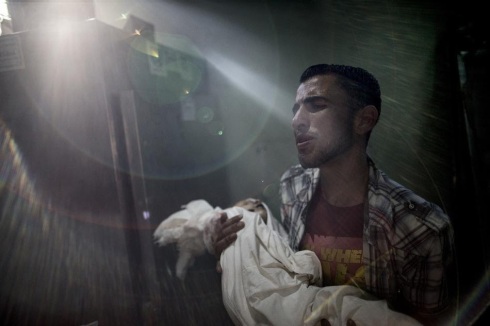
A relative of two-year old Lamar Radiya holds her body at the morgue of the Kamal Adwan hospital in Beit Lahia: photo by Marco Longari / AFP,, 24 July 2014
Fady Joudah’s translation of “State of Seige” can be found in his translation of Darwish’s The Butterfly’s Burden:
https://www.powells.com/biblio/9781556592416
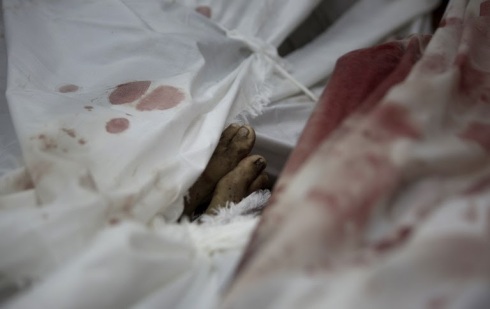
The body of Ali al-Shibari, a 10-year-old Palestinian child who was killed after a UN school in the northern Beit Hanun district of the Gaza Strip was hit by an Israeli shell, lies wrapped in shrouds at the morgue of the Kamal Adwan hospital in Beit Lahiya on July 24, 2014: photo by Mahmud Hams / AFP, 24 July 201
See also Unfortunately It Was Paradise: Selected Poems by Mahmoud Darwish,

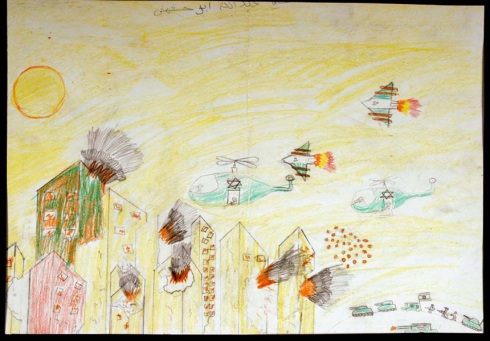
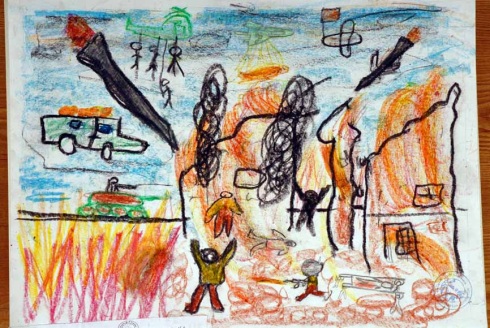
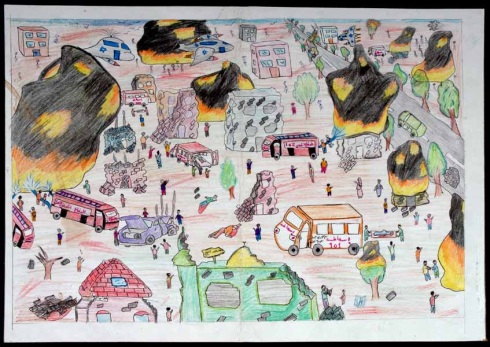
Leave a comment
Comments feed for this article